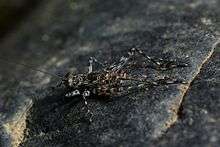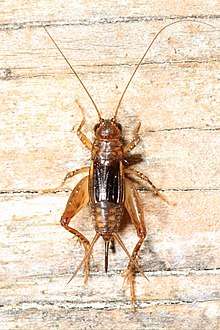Nemobiinae
Nemobiinae is a subfamily of the newly constituted Trigonidiidae,[1] one of the cricket families. The type genus is Nemobius, which includes the wood cricket,[2] but members of this subfamily may also be known as "ground crickets" or "pygmy field crickets".
| Nemobiinae | |
|---|---|
| Nemobius sylvestris | |
| Scientific classification | |
| Kingdom: | Animalia |
| Phylum: | Arthropoda |
| Class: | Insecta |
| Order: | Orthoptera |
| Suborder: | Ensifera |
| Family: | Trigonidiidae |
| Subfamily: | Nemobiinae Saussure, 1877 [1] |
| Genera | |
|
| |
.jpg)

Characteristics
Ground crickets are small insects, generally less than 15 mm (0.6 in) long, and less robust than crickets in the subfamily Gryllinae. The thorax is densely bristled and the abdomen is also bristly. There are four (or sometimes three) pairs of long, movable spines above the tip of the abdomen. The ovipositor varies from being long, straight and needle-like, to short, curved and sabre-like.[3] These crickets have wings of variable lengths and are generally brown, a suitable colour for concealment among the leaf litter and plant bases where they live. They are often active during the day and can be quite common in woodland and pastureland. They are omnivores. There are about two hundred species worldwide.[4]
Tribes and genera
The following tribes and genera are included in subfamily Nemobiinae in the Orthoptera Species File:[1]
Marinemobiini
Auth: Gorochov 1985; East Asia, Australia
- Apteronemobius Chopard, 1929
- Caconemobius Kirby, 1906
- Eumarinemobius Gorochov & Tan, 2018
- Marinemobius Gorochov, 1985
- Parapteronemobius Furukawa, 1970
Nemobiini
(synonym: Thetellini Otte & Alexander 1983)
Auth: Saussure 1877; South America, Europe, Africa, Asia and the Pacific
- Amonemobius Otte, 1987
- Bobilla Otte & Alexander, 1983
- Bullita Gorochov, 1986
- Dictyonemobius Chopard, 1951
- Ignambina Otte, 1987
- Ionemobius Otte, 1987
- Koghiella Otte, 1987
- Leptonemobius Sjöstedt, 1917
- Monopteropsis de Mello & Jacomini, 1994
- Nambungia Otte & Alexander, 1983
- Narellina Otte, 1994
- Nemobius Serville, 1838
- Orintia Gorochov, 1986
- Paniella Otte, 1987
- Paranemobius Saussure, 1877
- Silvinella Otte & Alexander, 1983
- Specnia Otte & Alexander, 1983
- Speonemobius Chopard, 1924
- Tahitinemobius Gorochov, 1986
- Thetella Otte & Alexander, 1983
- Tincanita Otte & Alexander, 1983
Pteronemobiini
Auth: Vickery, 1973, Worldwide distribution

- Allonemobius Hebard, 1913
- Amanayara de Mello & Jacomini, 1994
- Argizala Walker, 1869
- Dianemobius Vickery, 1973
- Eunemobius Hebard, 1913
- Kevanemobius Bolfarini & de Mello, 2012
- Neonemobius Hebard, 1913
- Phoremia Desutter-Grandcolas, 1993
- Pictonemobius Vickery & Johnstone, 1970
- Polionemobius Gorochov, 1983
- Pteronemobius Jacobson, 1904
- Stenonemobius Gorochov, 1981
incertae sedis
- Absonemobius Desutter-Grandcolas, 1993
- †Baltonemobius Gorochov, 2010
- Calperum Rentz & Su, 1996
- Cophonemobius Chopard, 1929
- Cophoscottia Chopard, 1951
- Homonemobius Chopard, 1935
- Hygronemobius Hebard, 1913
- Kanakinemobius Desutter-Grandcolas, 2016
- Micronemobius Ingrisch, 1987
- Ngamarlanguia Rentz & Su, 1996
- Paora Gorochov, 1986
- Pineronemobius Yong, 2018
- Scottiola Uvarov, 1940
- Sudanicus Werner, 1913
- Tahitina Hebard, 1935
- Taiwanemobius Yang & Chang, 1996
- Territirritia Rentz & Su, 1996
- Zucchiella de Mello, 1990
References
- "Subfamily Nemobiinae - Saussure, 1877". Orthoptera Species File. Retrieved 4 February 2019.
- "Nemobius sylvestris (Bosc, 1792) – Wood Cricket". Natural History Museum. Retrieved 4 October 2018.
- DiTerlizzi, Tony (2014-02-21). "Subfamily Nemobiinae - Ground Crickets". BugGuide. Missing or empty
|url=(help) - Capinera, John L. (2008). Encyclopedia of Entomology. Springer Science & Business Media. pp. 1704–1705. ISBN 978-1-4020-6242-1.